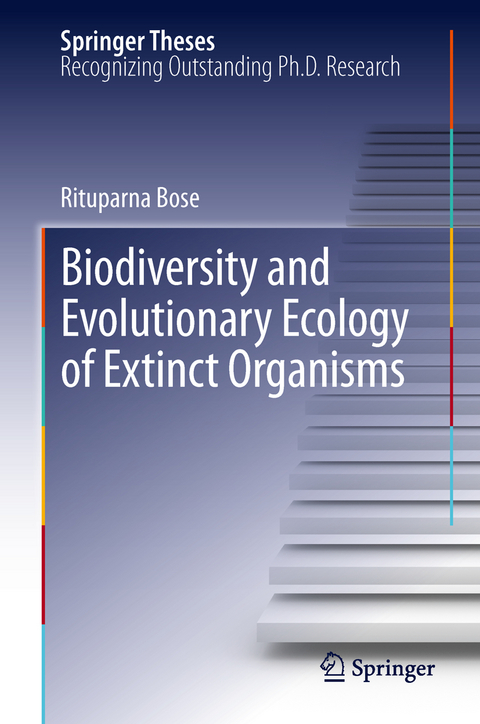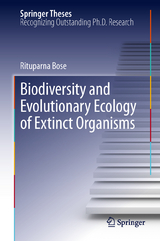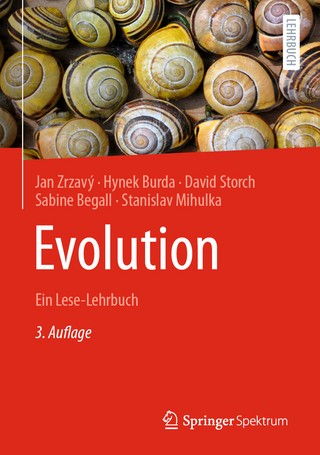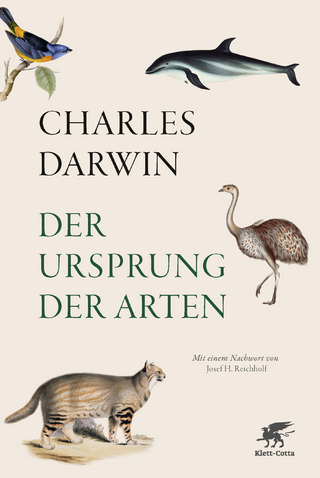Biodiversity and Evolutionary Ecology of Extinct Organisms
Springer Berlin (Verlag)
978-3-642-31720-0 (ISBN)
Increasing rate of species extinction in the present day will lead to a huge biodiversity crisis; eventually, this will lead to the paucity of non-renewable resources of energy making our Earth unsustainable in future. To save our mother planet from this crisis, studies need to be performed to discover abundant new fossil sites on Earth for continued access to oil-rich locations. Most importantly, a holistic approach is necessary in solving the present problem of biodiversity loss. This book presents newly developed quantitative models in understanding the biodiversity, evolution and ecology of extinct organisms. This will assist future earth scientists in understanding the natural and anthropogenic causes behind biodiversity crisis and ecosystem collapse. In addition, this study can be of great interest to exploration geologists and geophysicists in potentially unraveling natural resources from our sustainable Earth.
Dr. Rituparna Bose (M.S., PhD) is currently an adjunct Assistant Professor in the Department of Earth and Atmospheric Sciences in the City College of New York. Dr. Bose obtained her undergraduate education at the University of Calcutta, India and authored a thesis paper in environmental geology (coastal management). She came to United States in 2004 to pursue higher studies. During the course of her graduate studies at Bowling Green State University and Indiana University at Bloomington, she was the primary author in multiple high-impact peer-reviewed publications. Here she was awarded the Indiana University Dissertation Year Research Fellowship which is given to the best doctoral students of the university. Her work with Dr. Margaret Yacobucci and Dr. David Polly culminated in major findings in evaluating the evolution and determining the biodiversity of extinct organisms. As a result of her findings which have profound implications in bio-conservation, she won major national awards like the Theodore Roosevelt Memorial Grant (American Museum of Natural History) and Schuchert and Dunbar Grant (Yale Peabody Museum of Natural History). Additionally, BP Global Energy Group funded her to present these findings at North American Paleontology Convention (NAPC) by the prestigious NAPC Travel Award. Dr. Bose continues to pursue both her teaching and research career. Her research interests lie in applications of quantitative algorithms to study evolutionary biology, micropaleontology, disaster management studies and other applied geological sciences. In addition, she teaches courses in Physical Geology, Earth System Science, Environmental Geology, Natural Disasters and Historical Geology.
A geometric morphometric approach in assessing paleontological problems in atrypid taxonomy, phylogeny, evolution and ecology.- Testing the taxonomy and phylogeny of eastern North American atrypid brachiopods: a geometric morphometric approach.-. Morphological evolution in an atrypid brachiopod lineage from the middle Devonian Traverse Group of Michigan, USA: a geometric morphometric approach.- Morphological shape, episkeletobiont analysis, and life orientation in Pseudoatrypa cf. lineata (brachiopoda) from the lower Genshaw Formation of the middle Devonian Traverse Group, Michigan: a geometric morphometric approach.- Success of geometric morphometrics in deducing morphological shape change patterns in Paleozoic atrypids.
"The BOSE's book is enriching, and it provides a lot of matter for further thoughts. ... this book is a new word in palaeontology. ... BOSE's book presents many 'fresh' ideas and stimulates further research in palaebiology. It also stresses the importance of brachiopods for the understanding of the mid-Palaeozoic evolution of life in the sea. The reviewer tends to recommend this book strongly to all brachiopodologists, palaeobiologists, and specialists working with the Middle Palaeozoic ecosystems." (Dmitry A. Ruban, Zentralblatt für Geologie und Paläontologie, Issue 1-2, 2014)
| Erscheint lt. Verlag | 11.8.2012 |
|---|---|
| Reihe/Serie | Springer Theses |
| Zusatzinfo | XVIII, 102 p. |
| Verlagsort | Berlin |
| Sprache | englisch |
| Maße | 155 x 235 mm |
| Gewicht | 326 g |
| Themenwelt | Naturwissenschaften ► Biologie ► Evolution |
| Naturwissenschaften ► Geowissenschaften ► Geografie / Kartografie | |
| Naturwissenschaften ► Geowissenschaften ► Mineralogie / Paläontologie | |
| Weitere Fachgebiete ► Land- / Forstwirtschaft / Fischerei | |
| Schlagworte | Biodiversität • Biodiversität / Artenvielfalt • Biodiversity Crisis • Biogeoscience • Ecosystem Collapse • Ecosystem Conservation • Evolution and Ecology of Eextinct Organisms • Evolutionsökologie • fossils • Geometric Morphometrics • paleontology • Stratigraphy • Taxonomy |
| ISBN-10 | 3-642-31720-0 / 3642317200 |
| ISBN-13 | 978-3-642-31720-0 / 9783642317200 |
| Zustand | Neuware |
| Informationen gemäß Produktsicherheitsverordnung (GPSR) | |
| Haben Sie eine Frage zum Produkt? |
aus dem Bereich




